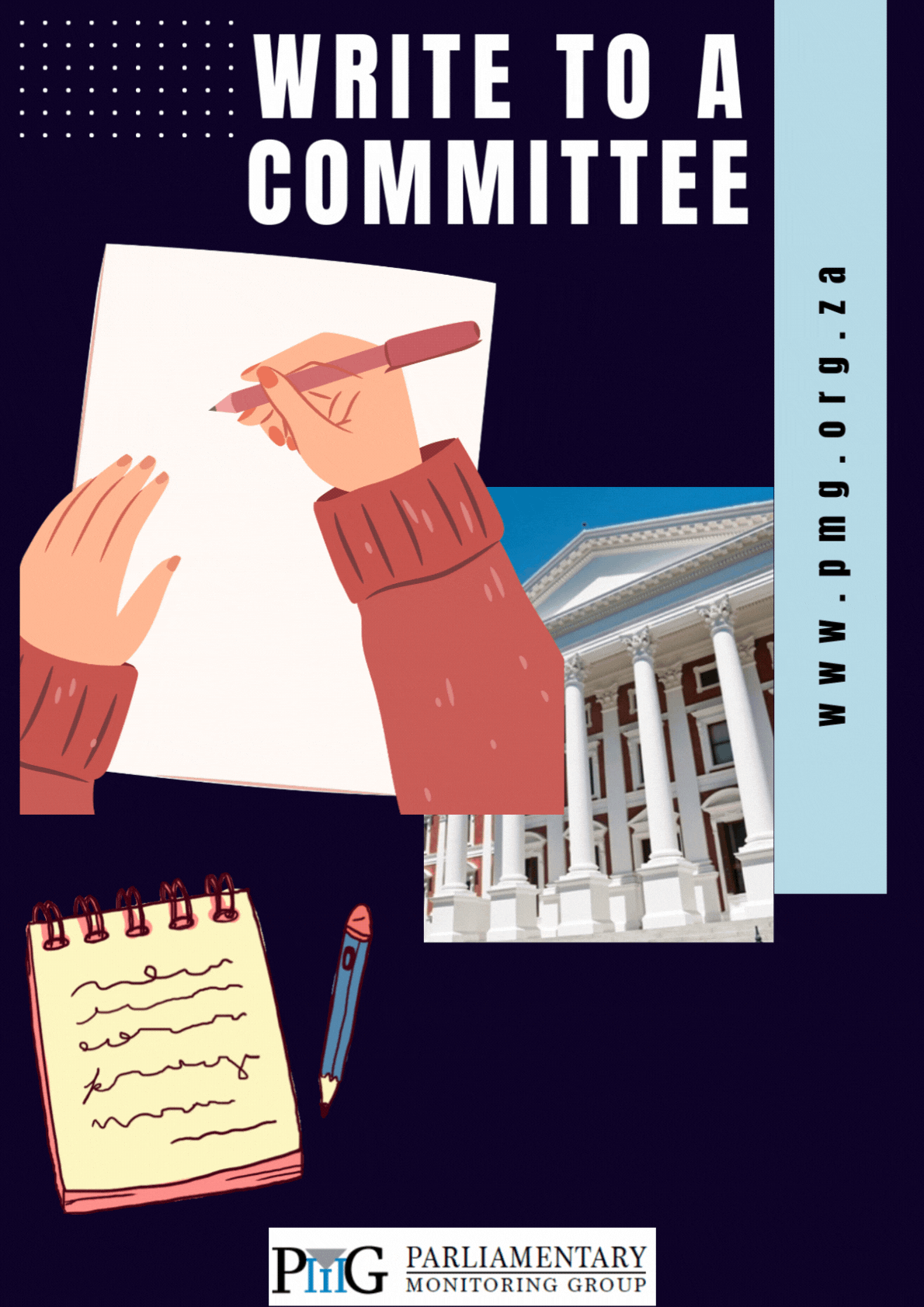Write to a Parliamentary Committee 2024

Committees are an important venue for parliamentary activities. They are the site where most of Parliament’s business is organised.
Submit your input directly to a Committee here: https://www.pa.org.za/write-committees/recipients/
Committees have more time to study, interrogate and debate proposed legislation, policy proposals and budget plans, and to conduct oversight. There is a parliamentary committee responsible for overseeing each government department. They also provide a platform for the public to engage with Members of Parliament (MPs) directly.
Committees hold weekly meetings to engage departments and entities on topical issues and other policy and legislative mandates. The work of committees traverses the following:
- overseeing Strategic Plans, Annual Performance Plans (APPs), Budgets and Annual Reports of a department and its entities;
- overseeing the implementation of a department and entities’ programmes and budgetary use and their implementation of the National Development Plan thematic areas (for example, quality of education, skills development, healthcare, housing, water, electricity and sanitation);
- processing legislation and statutory appointments;
- holding public hearings on topical issues and legislation;
- holding inquiries;
- undertaking study tours and oversight visits to provinces and entities and engaging other relevant government departments and institutions such as the Auditor-General of SA (AGSA), the Financial and Fiscal Commission (FFC), the Department of Planning, Monitoring and Evaluation (DPME), etc. on sectoral issues.
Committees derive their mandate from the Constitution and the Rules of Parliament.
Each Committee determines its programme of work. In practice, most committees decide on their schedule and priorities before or at the start of every new parliamentary term.
Committees employ the use of a Management Committee (comprised of the Committee Chair and Committee staff) to draft the programme. When they do this, they consider the Committee’s legislative priorities, mandate and standing items such as the passing of departmental budgets. Committee members themselves can also generate topics for inquiries. Work programmes must be approved by the full Committee and are flexible to consider changing priorities and the political climate.
Notably, stakeholder/interest groups and members of the public can influence Committee programmes but this is seldom done. Citizens have a right to proactively lobby for their concerns to be included in the programme and to highlight what issues should be prioritised. Further, they can provide parliamentary committees with on-the-ground feedback and expert information.
While Parliament does create opportunities for public participation, you do not have to wait for an invitation and can interact with a Committee or individual lawmakers at any time.
Before you engage, we suggest you get to learn more about the relevant committee, its mandate and what it has done (see here ). Also, check the programme to see upcoming meetings.
*Committees have different focus areas and oversee different departments and entities.
We suggest you use the questions below as a guide when writing to the Committee.
i. What issues should the relevant Committee put on its agenda and list of priorities?
ii. These are the last few weeks of the Sixth Parliament and the lifespan of all Committees will end in March 2024. What should the Committee try to achieve in this remaining period?
iii. Do you have specific experience, information, and research (specifically on the performance of a relevant department and entity that the Committee is overseeing) that could assist the Committee, and if so what?
iv. What questions should the Committee be asking as it undertakes its oversight work?
v. Do you have any advice on how the Committee can improve its oversight?
vi. Committees approve the budgets of Departments and entities. They also recommend that the National Treasury should either increase or not reduce departmental allocations. What departments and entities should receive more money and why?
vii. In line with its powers and functions, is there a specific investigation and/or inquiry that a Committee should be instituting?
viii. Committees consider legislation from the Executive. They also have the power to initiate legislation. What legislative gaps exist and what legislative fixes are needed? Although ordinary citizens may not submit bills to Parliament, they may lobby MPs or committees to introduce legislation that deals with their concerns.
Submit your input directly to the Committee here: https://www.pa.org.za/write-committees/recipients/ or email Committee Secretaries using the contact details here.
You can find calls for formal submissions here
About this blog

"That week in Parliament" is a series of blog posts in which the important Parliamentary events of the week are discussed.
We host the latest posts of this blog, written by People's Assembly. You can find more on PA's blog.
About this blog

"That week in Parliament" is a series of blog posts in which the important Parliamentary events of the week are discussed.
We host the latest posts of this blog, written by People's Assembly. You can find more on PA's blog.
